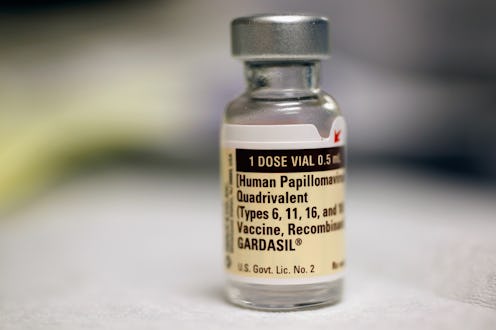Not to, y’know, freak you out or anything, but there’s a pretty strong chance you have an STD — and you might not even know it. A whopping 69 percent of healthy Americans have HPV, according to a new survey by New York University. I think I speak for all of us when I say...yikes.
To be fair, the CDC's fact sheet on HPV notes that the virus is, in fact, the most common STD; it’s so common that nearly all sexually active men and women will get it at some point in their lives. There are a total of 143 different strains of the human papillomavirus, and it’s true that most people will eventually pass the virus out of their system with no ill effects. But the NYU study, lead by senior researcher Zhiheng Pei, MD, Ph.D., also revealed that four percent of those infected with it have one of the two strains known to cause most forms of cervical cancer, some forms of throat cancer, and genital warts. Four percent may not seem like a lot; but given that there are 317 million people living in the United States, that means that 21,873,000 have some form of HPV, and roughly 874,920 of those have the cancer-causing ones. That’s a pretty big number, and it’s something that we should probably all be aware of — and take preventative measures against.
How? First and foremost, vaccination (sorry, anti-vaxxers). The CDC recommends that all boys and girls ages 11 or 12 years should get vaccinated; catch-up vaccines are also recommended for men through age 21 and females through 26, if they didn’t get vaccinated when they were younger. According to the Huffington Post, the President’s Cancer Panel recently released a report with some unfortunate figures: In 2012, only a third of 13-to-17-year-old girls in the U.S. received all three doses of the HPV vaccine — far, far short of the U.S. Department of Health and Human Services Healthy People 2020 goal of having 80 percent of girls in that age group vaccinated. The numbers were even worse for males: Only seven percent of 13-to-17-year-old boys received the vaccination.
Nope. Not good at all.
Why is getting vaccinated against HPV so important? Mostly because it’s so tricky to find out if you have it. In addition to giving us some new numbers, Dr. Pei says that the NYU study also highlights the weaknesses in current clinical test kits for HPV. The kits are designed to recognize only about a dozen viral types tied to cervical cancer; we need much broader detection methods and comprehensive diagnostic tests in order to accurately assess whether or not people are actually infected with HPV, and if so, with what strain. From here, the team plans to investigate which generally non-cancer-causing HPV types might actually play a role in cancers of the cervix, mouth, and skin; they’re also working on developing better diagnostic tests.
NPR’s Rob Stein wrote today about something that may go at least a little ways towards better, more accurate diagnosis, at least for women: There’s a debate currently raging about whether the Pap smear, typically used as a cervical cancer detection method, should be replaced by HPV tests. The Food and Drug Administration recently approved an HPV test for use as a primary screening tool for cervical cancer, and the test’s manufacturer, Roche Molecular Diagnostics, firmly believes that the test can catch more women at risk for cervical cancer much earlier. Said Paul Brown, president of the company, “If we can detect either the risk or early disease much earlier on, then we should have many [fewer] women ultimately getting cervical cancer. And that’s, of course, the holy grail.” It’s also possible, though, that replacing the Pap smear with the HPV test might end up leading to a whole lot of women getting unnecessary follow-up tests like colposcopies. Furthermore, not all forms of cervical cancer are caused by HPV. Commented Diana Zuckerman of the Cancer Prevention and Treatment Fund, “Our greatest fear is that replacing the Pap smear with the HPV test will result in more getting cervical cancer — and dying from cervical cancer — rather than fewer.”
At least there’s a little bit of good news here, too: According to a new study in the Journal of Clinical Oncology, spouses and long-term partners of patients with HPV-related oral cancers don’t seem to have any sort of increased risk of the infection themselves. So, y’know… there’s that. In the meantime, take care of yourselves, okay? And for the love of all that is holy, get tested regularly!
